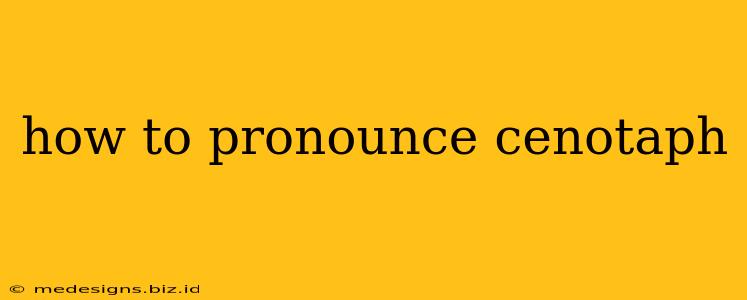Many people stumble over the pronunciation of "cenotaph," a word that evokes a sense of solemn remembrance. This guide will break down how to pronounce this word correctly, ensuring you can speak with confidence and clarity.
Understanding the Word's Origin
Before diving into pronunciation, understanding the word's etymology helps. "Cenotaph" comes from the Greek words kenos (empty) and taphos (tomb). This literally translates to "empty tomb," reflecting the monument's nature as a memorial to someone buried elsewhere, or whose remains are unknown. This understanding provides context for the pronunciation.
Phonetic Breakdown and Pronunciation
The most accurate pronunciation of "cenotaph" is: sen-o-taf.
Let's break it down phonetically:
- sen: Pronounced like the beginning of the word "sense," with a soft "s" sound.
- o: A short "o" sound, as in "hot" or "cot."
- taf: Pronounced like the word "taff," with a hard "t" sound.
Therefore, the emphasis should fall on the first syllable: SEN-o-taf.
Common Mispronunciations to Avoid:
- sen-o-tahf: Avoid adding an extra syllable or changing the vowel sound in the final syllable.
- seen-o-taf: The first syllable should not sound like "seen."
- seh-no-taf: The "c" is always pronounced as a soft "s" sound in this word, not a "k" sound.
Practice Makes Perfect
The best way to master the pronunciation of "cenotaph" is through practice. Try saying the word aloud repeatedly, focusing on the correct sounds and syllable stress. You can also find audio pronunciations online (though be sure to check for accurate sources!) to hear the word spoken correctly.
Using "Cenotaph" in a Sentence
To solidify your understanding, let's see how to use "cenotaph" in a sentence:
- "The cenotaph stood as a solemn tribute to the fallen soldiers."
- "Visitors paused respectfully before the majestic cenotaph."
- "The city unveiled a new cenotaph to commemorate the victims of the tragedy."
Beyond Pronunciation: Understanding the Significance
While knowing how to pronounce "cenotaph" is important, understanding its significance is equally crucial. It represents a powerful symbol of remembrance and respect, a lasting tribute to those who have passed.
By following this guide, you'll be able to confidently pronounce "cenotaph" and engage in meaningful conversations about its historical and cultural significance. Remember, practice and a little phonetic awareness go a long way!
